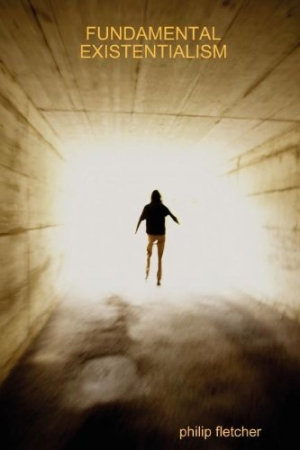Fundamental Existentialism
The Emotional Blackmail of Existence
In this odd and often repetitive collection of journal entries, e-mails, letters to the editor, midnight scribblings, disjointed poems, badly rhymed limericks, and muddled diary entries, Philip Fletcher chronicles the physical, mental, and emotional collapse of a man who, it seems, experienced happiness only during his admittedly misspent youth. Fletcher comments on everything from the lonely death of British comedian Benny Hill to “mindless and moronic acts of urban terrorism.” In addition, he revises a handful of old rock songs using his own lewd lyrics.
That he has “a long, unbroken history of waking up alone on ‘Christmas morn,’ with only a raging hangover for company” is a sad and brave confession from a man who has “classified myself as Britain’s most unloved man.” This view into his psyche might have opened a door to something of value. Unfortunately, it does not. Fletcher’s book lacks structure, and his writings often go on and on about feeling sorry for himself. At one point he laments that “it’s a sin how I’m paying for the excesses of my youth.”
Although billed as “4 collections in one volume,” Fletcher includes a fifth part entitled “Existentialism,” which he published as an eighteen-page pamphlet in 2004. (“I still have a lot of unsold copies,” he notes.) Despite the title, there is no philosophical insight here, only additional revelations about how “I’ve been completely frustrated and thwarted by my life” to the point of contemplating suicide. He does finally take some action to change his situation by moving from England to Thailand, but he quickly falls back into the same rut, finding himself once again “stuck in a room most of the time watching TV.”
In addressing his own mental health, he notes how “the actual physical effects of the depression were horrendous,” but he takes little action to find help, even when he reaches what he calls the “absolute nadir of mental distress.” While Fletcher is unquestionably a man in great emotional pain and should be praised for honestly opening up and sharing his hurt with the world, his book will offer neither comfort nor sympathy for those in similar distress.
Reviewed by
Mark McLaughlin
Disclosure: This article is not an endorsement, but a review. The publisher of this book provided free copies of the book and paid a small fee to have their book reviewed by a professional reviewer. Foreword Reviews and Clarion Reviews make no guarantee that the publisher will receive a positive review. Foreword Magazine, Inc. is disclosing this in accordance with the Federal Trade Commission’s 16 CFR, Part 255.

